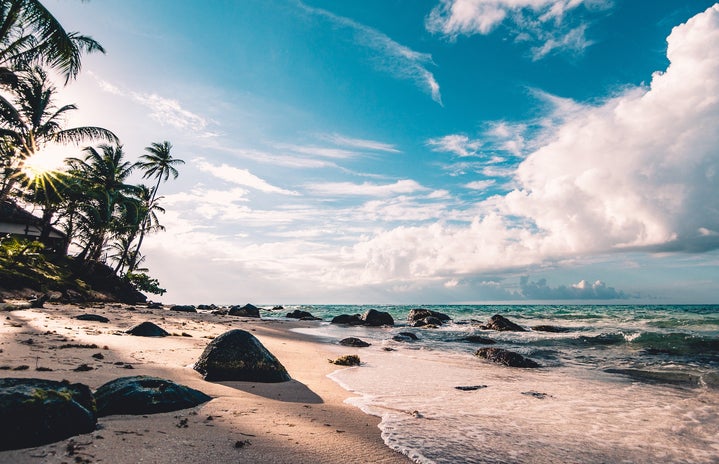Content Warning: mention of predatory behavior and unwanted sexual advances.
Survivor has been airing for an impressive 20 years– still managing to capture millions of viewers on a weekly basis. The premise of the show is that 18-20 Americans are stranded in a remote location where they must battle the elements, the lack of basic necessities, and most importantly: each other. The famous catchphrase, “outwit, outplay, outlast” alludes to how contestants must find the perfect balance of physical, social, and strategic gameplay in order to be one of the last few standing after 39 days. The twist? The contestants voted out along the way are also the ones who choose who receives the $1 million prize in the end.
When you put 20 starving, mentally and physically exhausted adults together in a game for $1 million, tensions and emotions are bound to run high. The Survivor environment forces contestants to break themselves down to a very vulnerable point. Host Jeff Probst has described the show multiple times as “…a microcosm for our real world.” As a viewer, it’s always interesting to see what real-world issues and themes arise from season to season depending on the group. Sometimes it’s religion, sometimes it’s sexuality and gender, sometimes it’s race. But in the age of the #MeToo movement, many recent seasons have delved into the issue of women’s rights.
The show began almost as equally as you can get, with 13 men and 12 women winning over the first 25 seasons. However, in the last 15 seasons, only 3 women have won the game. So, what happened?
One of the main theories as to why men have dominated the title of “Sole Survivor” has to do with the addition of hidden immunity idols. Hidden immunity idols were introduced back in season 11 and have become a major part of the game in every season since. Finding one and using it correctly is viewed as one of the biggest moves you can make. It can ultimately make or break someone’s chance to win. In recent seasons, men have found many more of these idols than women. Some former female players say this could be because men take on the role of gatherers, giving them more time and opportunities to go out and search for idols, while women stay back at camp and tend to cooking or laundry duties.
Angelina Keeley of Survivor 37, David vs. Goliath, brought up this point during a tribal council. She openly talked about wanting to reverse this trend of male-dominated hidden immunity idols and ended up doing exactly what she set out to do. In the two seasons after, more women than usual found idols, however, none of this translated into any wins.
Another reason for this disparity is that men are rewarded for playing aggressively, while women are punished for the same behavior. And the numbers don’t lie: out of the 146 jury votes cast for a winner in the last 15 seasons, just 30 have gone to women.
Many women cast on the show in recent years have set out to try and change the course of this gender bias. More and more they have shown great strength in speaking out against any injustices they may have faced during their time on the show.
Most notably was contestant Kellee Kim of season 39, Island of the Idols, who has since been nationally praised for her actions. Over the course of the season, several women accused fellow contestant Dan Spilo of repeated inappropriate touching and making them all feel uncomfortable. This is a perfect example of how complicated and competitive the Survivor environment can be, as all the women involved were torn with how to proceed.
In a conversation with Kellee about the situation, contestant Missy Byrd described her uncertainty. “It’s a game so I’m assuming nobody will want to say something, ‘cause you can’t make a scene right?”
An emotional Kellee explained, “There are always consequences for standing up. This happens in real life, in work settings, in school…like you can’t say anything because it’s gonna affect your upward trajectory, it’s going to affect how people look at you.”
As the situation progressed, this instance was the first time in history the game was completely put aside. Producers stepped in and held group and individual meetings with the players, warning them about personal boundaries and that producers were available to them at all times. They also held a private meeting with Dan cautioning him about his actions. Due to the outcome of these conversations, the game continued normally for a few more days, until finally, his warnings ran out.
On day 36, host Jeff Probst made the rare appearance at the tribe’s camp and broke the news that Dan had been completely removed from all aspects of the game. At the end of the episode, a black background with text saying, “Dan was removed from the game after a report of another incident which happened off-camera and did not involve a player.” appeared on screen.
The way the situation was handled ended up being very controversial; as many viewers disliked the vagueness of it all. Kellee Kim spoke out on Twitter after the episode aired, saying, “While Dan’s dismissal has validated the concerns that I raised from the beginning of this season, I wish that no one else had to be subjected to this type of behavior…I’m glad that my decision to speak up made a difference.”
All of these situations show just how real Survivor can get. Although the gender disparity is not completely solved, we have these strong women to thank for speaking up on these issues and bringing attention to them in the game setting, as well as the real world.
We’ll see what future seasons bring once filming begins again in the spring of 2021.



